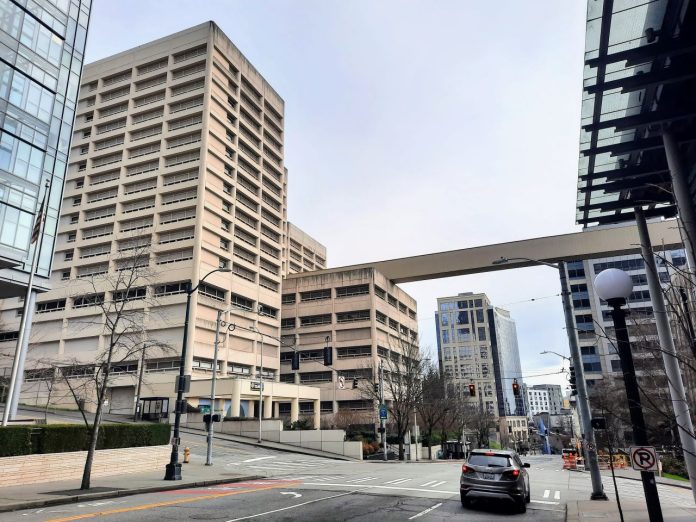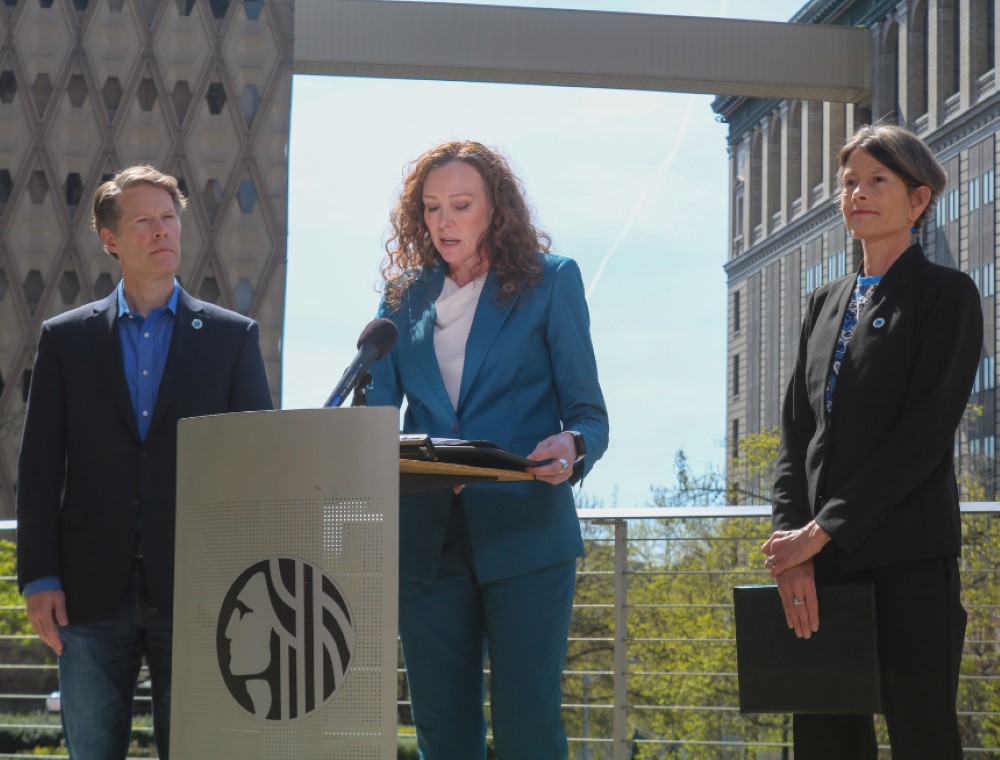
On Wednesday, the Seattle City Council’s public safety committee met to discuss Mayor Bruce Harrell’s recent proposal to institute a pilot program, which would enter into a new contract with the South Correctional Facility (SCORE) jail to house a limited number of people accused of simple misdemeanors, such as criminal trespass and shoplifting.
Under this new contract, SCORE would be used to hold misdemeanor offenders for 24 to 48 hours if they are medically cleared to be booked and would allow the city to utilize at least 20 beds at the facility at a cost of around $2 million a year. About 10% of the beds are expected to be mental health beds.
Council Central Staff analyst Greg Doss said the process around this pilot has been moving quickly. In spite of many outstanding logistical questions, the committee voted to pass the SCORE legislation out of committee in a 4-0 vote, with Councilmember Joy Hollingsworth abstaining. A full council vote is expected on Tuesday, August 6.
The SCORE jail, located in Des Moines, is run by six cities in South King County and has 41 interlocal agreements with cities in the greater region.

In 2019, the mortality rate at jails in Washington State ranked fourth highest nationwide, and at least six people have died at SCORE in the last year, including one reported case of malnutrition.
“SCORE has had a very high death rate, higher than almost any other jail in the state,” said Molly Gilbert, the Bargaining Union President of SEIU 925 representing public defenders. “They’ve shown that they do not care for people who are booked that are indigent.”
Public safety committee chair Bob Kettle argued the new jail contract will help tackle the permissive environment that he credits with causing Seattle’s public safety challenges. “The bottom line is we’re getting our public safety shop in order,” Kettle said.
The history of the King County and SCORE Jails
The city of Seattle has a multi-million dollar contract with King County to house people at the King County Jail in downtown Seattle. In 2020, the King County Department of Adult and Juvenile Detention (DAJD) instituted booking restrictions as a result of the Covid-19 pandemic, allowing only people accused of serious misdemeanors, like driving under the influence and domestic violence, to be booked. Those booking restrictions have continued until the present day due to severe understaffing at the jail.
The new Council has complained multiple times over the last several months about the booking restrictions and the inability to use all the beds in the jail that are included in the contract.
Last year the ACLU of Washington filed a lawsuit against King County, alleging that even with the booking restrictions, conditions at the jail had deteriorated so much the County was violating a legal agreement to protect the health and safety of those housed there.
That being said, the DAJD has relaxed its booking restrictions in certain circumstances. The jail agreed to book people through the High Utilizer Initiative spearheaded by City Attorney Ann Davison in 2022. This program focuses on people who have at least 12 misdemeanor referrals to the City Attorney’s Office within five years.
At the request of new interim Chief of the Seattle Police Department (SPD) Sue Rahr, the DAJD also recently agreed to book certain simple misdemeanors that are committed in what is known as the Downtown Activation Zone, which covers Belltown, the downtown core, Pioneer Square, and the China-International District. SPD officers are now allowed to book people arrested in these areas for committing certain non-violent misdemeanors such as the new public drug use ordinance.
Meanwhile, King County entered into its own contract with SCORE last year, which only lasted three months.
The plan is to use SCORE to book people accused of committing nonviolent misdemeanors in other parts of the city.
Tensions between Seattle and King County
King County Executive Dow Constantine recently had a message sent on his behalf to the King County Council arguing that booking restrictions at the downtown jail aren’t the cause of Seattle’s public safety woes. The message argued that the jail makes exemptions to booking restrictions for compelling reasons, and that Davison’s office is failing to make those arguments in court.
Constantine’s message also suggests Seattle cancel its jail contract with King County, which is supposed to run until 2030: “The County is more than willing to immediately release the City from any further obligations under the 2012 contract. This would ameliorate [the DAJD]’s staffing challenges, and allow the County to focus on the more serious (felony) suspects and offenders, who are the County’s responsibility under state law.”
At the public safety committee meeting to discuss the new SCORE legislation, Andrew Myerberg, who is Chief Innovation Officer in the Harrell administration, was careful to make several mentions of what a good partner King County has been in discussing issues around the jail. King County and the City are currently bargaining over issues with the King County jail contract, and Myerberg said these negotiations were going well.

However, certain councilmembers seemed less rosy in their view of King County as a partner in this matter.
“I am not wild about spending an additional $4 million […] when we are not able to use the spots in the King County Jail for which we’ve already contracted,” Council President Sara Nelson said. She also said the county’s story about the reason for the King County Jail’s booking restrictions keeps changing.
Kettle mentioned he wants to start meeting with King County Councilmember Jorge Barón, who chairs the county’s law and justice committee, on a regular basis.
Concerns about the contract
Constantine isn’t the only one arguing that booking restrictions are not undermining public safety.
“Short jail stays can be very destabilizing to people and results in worse criminal justice outcomes and possibly in higher rates of recidivism,” said Anita Khandelwal, the Director of the King County Department of Public Defense (DPD).
A 2019 brief from the Vera Project says, “Studies suggest that pretrial detention results in worse outcomes: more and longer sentences to incarceration and increased recidivism.”
Khandelwal questioned what this pilot would accomplish. “We are engaged in a very expensive project to undermine our public safety,” she said.
In fact, Khandelwal felt so strongly that the Mayor’s Office was failing to address concerns she was raising, she publicly pulled out of the stakeholder process around the SCORE contract.
The ACLU Washington also sided with Khandelwal, and Caedmon Magboo Cahill, the organization’s director of policy advocacy spoke out during public comment Wednesday.
“Pretrial detention as a tool to disrupt unwanted behaviors is a false choice,” Cahill said. “This agreement will negatively affect the future safety of both the people who would be incarcerated and our broader community. Public safety is not served by destabilizing people, and this is exactly what this agreement would do.”
Both Khandelwal and Gilbert expressed skepticism that people housed at SCORE would receive the services the city says it intends to use this contract to offer them.
“SCORE absolutely oversells itself, and to anybody who is in a bureaucratic position and does not know how jails work and doesn’t intimately understand the criminal justice system, it appears to be very easy to believe everything being told by this jail,” Gilbert said. “But the one thing that we found from the county contract, which we just got out of, is that almost everything that SCORE promised was not delivered.”
This concern seemed supported by the City’s Director of Public Safety Natalie Walton-Anderson’s refusal to answer Councilmember Tammy Morales’s question as to how long it would take those booked at SCORE to actually receive services. Instead Walton-Anderson emphasized how many times services would be offered but said that they aren’t mandatory. Morales said she wants to see SCORE’s data on how many people receive treatment and what its outcomes are.
Among other concerns, Gilbert spoke about SCORE turning away attorneys who came to see clients, turning away social workers and other service providers, and having unreliable Wi-Fi and no cell phone reception. Video consultations with attorneys for those housed at SCORE are sometimes limited to 10 minutes and often aren’t in confidential locations. She worries any new clients housed at SCORE could have their defenses compromised.
Lisa Daugaard, the Co-Director of Purpose Dignity Action, has a different view. On the Seattle Nice podcast, she said that while jail isn’t rehabilitative or necessarily a deterrent, it is possible for a booking to have a positive disruptive effect. And she wants to bust the common myth that putting low-level misdemeanants into jail will help.
“I don’t think putting people in jail for those offenses would fix conditions on our streets,” Daugaard said, “but I do understand that absolutely prohibiting that fosters that belief. So in my opinion, it is better to allow discretion and then have a systemwide conversation on [why] that is not effective. And it doesn’t really make sense to do [pre-trial detention], except in very unusual circumstances.”
Cost and logistics
“It seems like there are a lot of operational issues that need to be figured out,” Morales said. “The memo Mr. Doss sent to us included the impact on the courts, more hearings, data systems, transport costs, travel time and time management of attorneys, the jurisdictional custody issues, in addition to cost.”
She went on to mention all the potential additional costs, some of which haven’t yet been estimated.
The city has already estimated it will cost $262,000 per year in overtime for SPD officers to escort people back and forth from the SCORE jail, but this cost would only cover two trips per day, six days a week. This is the only service aside from the jail contract itself that is included in the $2 million total estimate.
“At a time when SPD has a high vacancy rate and talks about their staffing challenges,” Khandelwal said, “why would they spend time on transporting low level misdemeanants to SCORE we all believe, per the stated plan, are going to get out in one to two days, rather than devoting those resources to, for example, solving current unsolved murder?”
Were the Seattle Municipal Court to institute virtual hearings, that would open up a host of other issues that could result in litigation, especially given the recent Luthi case that found that forcing individuals to appear from jail holding pens is unconstitutional.
RIght now the Seattle Municipal Court marshals are charged with transporting detainees between the King County Jail and the Seattle Municipal Court, so there are questions as to whether arranging different transportation would be a body of work issue.
There is also an open question as to where detainees will be kept once they’re at the Seattle Municipal Court, and whether facilities are available for them while they’re waiting that include enough space, the ability to provide food, and a place for confidential discussion with an attorney when required. Such facilities, once found, might bear an additional cost.
About the potential additional cost for public defenders, Gilbert was blunt. “I would absolutely say, as someone who can comment on it, this is going to be a high cost,” Gilbert said. “We already have a problem in public defense, extremely high turnover and burnout.”
Housing arrestees at SCORE would place a significant additional burden on public defenders, who would have to spend time driving back and forth between Des Moines and downtown Seattle… and that’s assuming they have access to a car. Right now the interlocal agreement between Seattle and the county requires public defenders to visit their clients in person within 24 hours of being booked, which is considered best practice. Whether this practice will continue is under question, however, since the agreement only covers county detention facilities, not SCORE.
An additional $150,000-$300,000 cost is estimated to provide a technological solution to necessary data exchanges between SPD, the City Attorney’s Office, Seattle Municipal Court, and SCORE. Implementing this technology could be a time-consuming process, and manual processes might have to be substituted in the meantime, which could place more of a burden on already overworked staff.
The city is facing a $260 million budget deficit this fall. Myerberg said the answers to how the pilot will be paid for will be in Harrell’s proposed budget released at the end of September, a good seven weeks after the Council is being asked to vote on the proposal.
“We don’t have all the answers,” Myerberg said, but he was quick to add, “We are confident we can resolve these issues.”
Amy Sundberg is the publisher of Notes from the Emerald City, a weekly newsletter on Seattle politics and policy with a particular focus on public safety, police accountability, and the criminal legal system. She also writes science fiction, fantasy, and horror novels. She is particularly fond of Seattle’s parks, where she can often be found walking her little dog.

